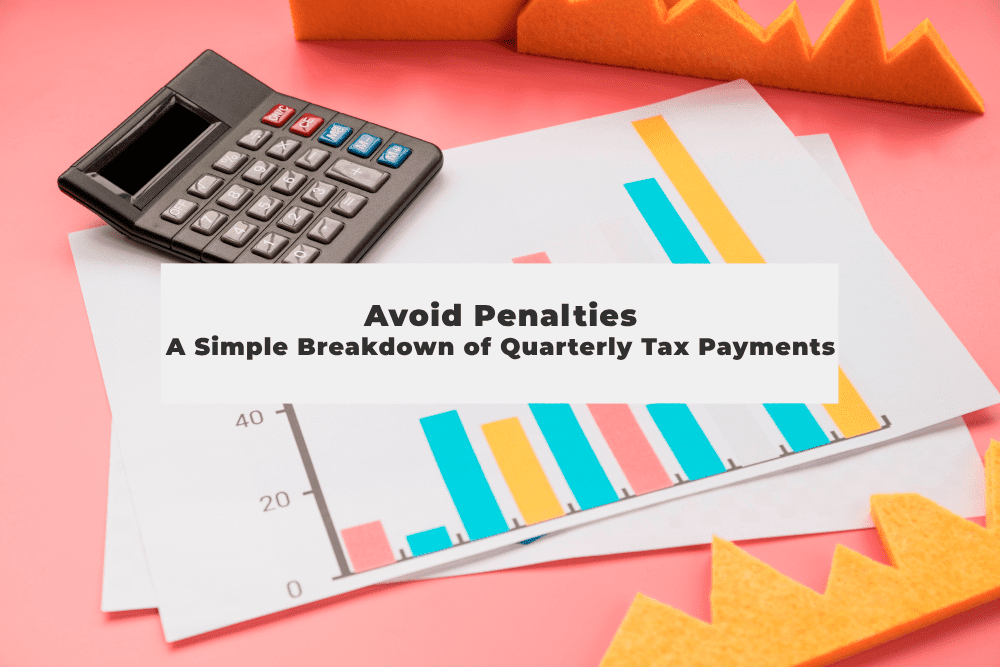As a small business owner, freelancer, or independent contractor, you may already know that paying taxes isn’t just a once-a-year task. The IRS requires you to make payments throughout the year, and missing these payments can lead to penalties. In this post, we’ll provide a simple breakdown of quarterly tax payments and explain the importance of quarterly estimated taxes so you can avoid unexpected fines and stay on top of your tax obligations.
Quarterly estimated taxes are essential for tax planning, helping you stay compliant and prevent costly penalties. Instead of facing a large tax bill in April, this system allows you to pay smaller amounts throughout the year. It’s particularly important if you’re self-employed or don’t have taxes withheld from your paycheck by an employer.
Who Needs to Pay Quarterly Estimated Taxes?
You might be asking yourself, “Do I really need to worry about this?” The answer is likely yes if you’re self-employed or receive income that doesn’t have taxes automatically withheld. This could include:
- Freelancers and independent contractors
- Small business owners
- Gig economy workers (Uber drivers, DoorDash workers, etc.)
- Landlords and real estate investors
- Retirees with significant investment income
Essentially, if you expect to owe $1,000 or more in taxes when you file your annual return, the IRS requires you to make quarterly payments. Ignoring this rule could lead to an underpayment penalty.
How to Calculate Your Quarterly Tax Payments
Calculating your quarterly taxes might sound daunting, but it’s relatively straightforward. Here’s a simple breakdown of the steps:
- Estimate your income: Review your income sources and estimate how much you expect to earn over the course of the year.
- Calculate your expected tax liability: Use the IRS tax brackets to determine how much tax you’ll owe based on your estimated income.
- Divide by four: Once you’ve figured out your total annual tax liability, divide it into four equal payments. These are your quarterly tax payments.
You can also use IRS Form 1040-ES to help with these calculations. Alternatively, tax software or a professional accountant can simplify this process for you.
Important Quarterly Tax Deadlines
The IRS has set specific deadlines for making your quarterly payments. Here’s a breakdown of the due dates for each payment:
- First Payment: April 15 (for income earned January to March)
- Second Payment: June 15 (for income earned April to May)
- Third Payment: September 15 (for income earned June to August)
- Fourth Payment: January 15 (for income earned September to December)
If any of these dates fall on a weekend or holiday, the deadline shifts to the next business day. Missing these deadlines could lead to penalties, so it’s important to mark them on your calendar.
How to Pay Your Quarterly Taxes
Paying your quarterly estimated taxes is easier than you might think. The IRS offers several convenient options:
- Online: The easiest and fastest way to pay is through the IRS Direct Pay system, which allows you to make payments directly from your bank account.
- Mail: If you prefer, you can mail a check or money order along with Form 1040-ES to the IRS.
- IRS2Go App: This mobile app offers a user-friendly way to make your payments directly from your smartphone.
Make sure you keep records of each payment, as you’ll need this information when you file your annual return.
What Happens If You Don’t Pay Quarterly Taxes?
Failure to make quarterly payments can result in some unpleasant penalties. If you owe more than $1,000 in taxes and haven’t made sufficient payments throughout the year, the IRS may charge you underpayment penalties.
These penalties can add up quickly. For each day your payment is late, you’ll be charged a percentage of the underpaid amount. This is why making quarterly payments is so crucial for avoiding unnecessary fees and stress.
Quarterly Estimated Taxes Importance for Small Business Owners
For small business owners, staying on top of quarterly payments is especially important. You might have various streams of income, and it’s easy to fall behind on tax obligations when you’re managing day-to-day operations. The IRS expects accurate and timely payments, and keeping up with these payments will prevent headaches down the line. Plus, it can help you better manage your cash flow, avoiding a big tax bill at the end of the year.
Pro Tip: Working with an accountant or tax professional can simplify this process. They’ll help you calculate what you owe and remind you of important deadlines. This is a great way to ensure you’re paying the right amount and avoiding penalties.
How to Avoid Penalties and Stay Compliant
The best way to avoid penalties is by being proactive. Here are some quick tips to ensure you stay compliant:
- Set reminders for each quarterly deadline.
- Keep track of your income and expenses throughout the year so you’re not scrambling to estimate when a payment is due.
- Work with a tax professional if you’re unsure about calculations or filing.
- Make sure your payments are on time, even if you can’t pay the full amount—partial payments are better than no payments at all.
By staying organized and making timely payments, you can avoid the stress of penalties and ensure that your tax obligations are handled efficiently.
Closing Thoughts
Making quarterly tax payments may seem like just another task on your to-do list, but it’s a critical step in avoiding penalties and staying compliant with IRS regulations. Whether you’re a freelancer, small business owner, or just receiving income without automatic withholdings, understanding the importance of quarterly estimated taxes will save you from unexpected surprises come tax season.
Need help calculating your quarterly payments or staying compliant? Schedule a free consultation with us today. We’ll ensure you’re on track and avoid costly penalties.
Schedule a Free Tax Consultation to get expert advice tailored to your situation and ensure you’re making the most of your quarterly payments.



